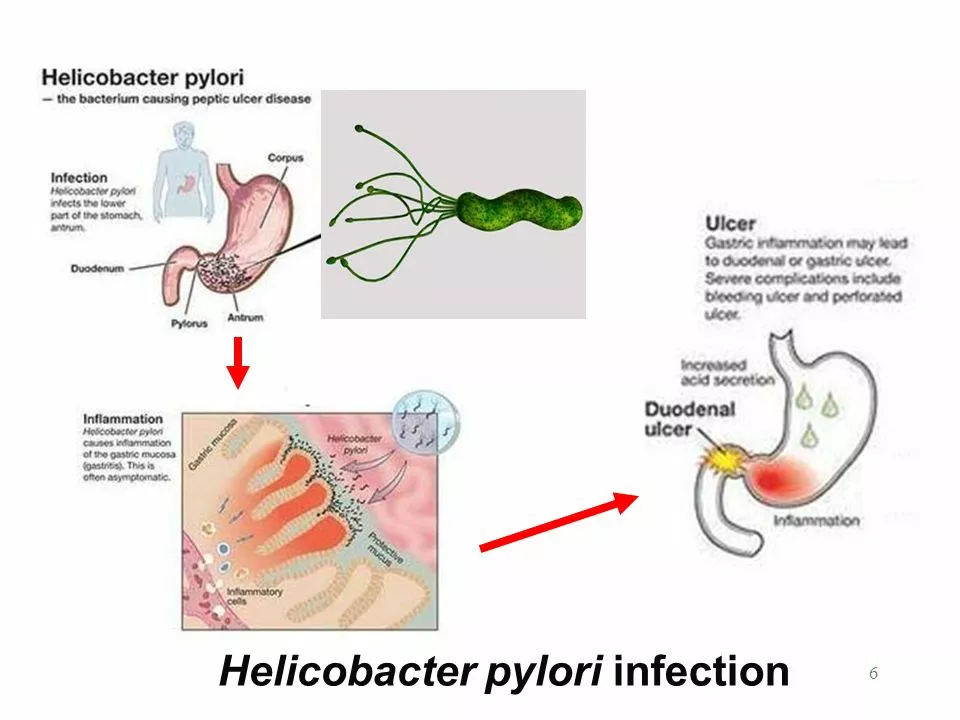Introduction: Understanding Ulcers and Helicobacter pylori
Ulcers are painful sores that can develop in the lining of the stomach, small intestine, or esophagus. One of the leading causes of ulcers is an infection from a bacteria called Helicobacter pylori (H. pylori). In this article, we will explore the link between ulcers and H. pylori infection, discussing how the bacteria causes ulcers, the risk factors, diagnosis, treatment, and prevention strategies. By the end of the article, you will have a better understanding of this common medical condition and how to protect yourself and your loved ones from it.
The Role of Helicobacter pylori in Ulcer Development
Helicobacter pylori is a bacteria that thrives in the acidic environment of the stomach. It is estimated that up to 50% of the world's population is infected with this bacteria, although not everyone will develop ulcers. H. pylori can cause inflammation and irritation in the stomach lining by producing an enzyme called urease. This enzyme neutralizes the stomach acid, allowing the bacteria to survive and multiply. Over time, the inflammation can weaken the protective lining of the stomach, leading to the development of ulcers.
Risk Factors for H. pylori Infection and Ulcer Development
There are several risk factors that can increase the likelihood of developing an H. pylori infection and subsequent ulcers. Some of the most common risk factors include:
- Living in crowded conditions: H. pylori can spread easily in crowded environments, such as in large families or shared living spaces.
- Living in a developing country: H. pylori infection rates are higher in developing countries, possibly due to poor sanitation and limited access to clean water.
- Family history: If a close family member has had an H. pylori infection or ulcers, you may be at an increased risk.
- Smoking: Smoking can weaken the protective lining of the stomach, making it more susceptible to damage from H. pylori.
- Excessive alcohol consumption: Drinking alcohol can also weaken the stomach lining and increase the risk of ulcers from H. pylori infection.
Diagnosing H. pylori Infection and Ulcers
If you are experiencing symptoms of an ulcer, such as abdominal pain, bloating, nausea, or vomiting, your doctor will likely want to test for H. pylori infection. There are several methods for diagnosing H. pylori, including:
- Blood test: A blood test can detect the presence of H. pylori antibodies, which indicate a current or past infection.
- Stool test: A stool sample can be tested for the presence of H. pylori antigens, indicating an active infection.
- Urea breath test: This non-invasive test measures the level of carbon dioxide in your breath after ingesting a substance containing urea. If H. pylori is present, the bacteria will break down the urea, increasing the level of carbon dioxide in your breath.
- Endoscopy: During an endoscopy, a small camera is inserted into the stomach through the mouth, allowing the doctor to visually inspect the stomach lining and take tissue samples for testing.
Treatment Options for H. pylori Infection and Ulcers
If you are diagnosed with an H. pylori infection and ulcers, your doctor will likely prescribe a combination of medications to help treat the infection and promote healing. This may include:
- Antibiotics: One or more antibiotics are typically prescribed to kill the H. pylori bacteria.
- Proton pump inhibitors (PPIs): These medications reduce the amount of stomach acid produced, allowing the ulcer to heal.
- H2 blockers: Similar to PPIs, these medications also reduce stomach acid production, promoting ulcer healing.
- Antacids: Over-the-counter antacids can help neutralize stomach acid and provide temporary relief from ulcer pain.
It is important to complete the full course of prescribed medications, even if your symptoms improve before the treatment is completed. This helps to ensure that the infection is fully treated and reduces the risk of a recurrence.
Preventing H. pylori Infection and Ulcer Development
While it is not always possible to prevent an H. pylori infection, there are some steps you can take to reduce your risk and protect your stomach health. These include:
- Washing your hands regularly: Proper hand hygiene can help prevent the spread of H. pylori and other harmful bacteria.
- Eating and drinking safely: Be cautious when consuming food and water in areas with poor sanitation or limited access to clean water.
- Avoiding smoking and excessive alcohol consumption: Both smoking and alcohol can weaken the stomach lining, increasing the risk of ulcers.
- Maintaining a healthy diet: Eating a balanced diet rich in fruits, vegetables, and whole grains can help support overall digestive health and reduce the risk of ulcers.
Living with H. pylori Infection and Ulcers
If you have been diagnosed with an H. pylori infection and ulcers, it is important to follow your doctor's recommendations for treatment and prevention. In addition to taking prescribed medications, you may need to make some lifestyle changes to support your stomach health, such as:
- Managing stress: Chronic stress can exacerbate ulcer symptoms and slow the healing process. Finding healthy ways to cope with stress, such as exercise, meditation, or therapy, can be beneficial.
- Avoiding trigger foods: Some people find that certain foods, such as spicy or acidic foods, can worsen their ulcer symptoms. Identifying and avoiding your trigger foods can help reduce discomfort.
- Eating smaller, more frequent meals: Large meals can increase stomach acid production and exacerbate ulcer pain. Eating smaller meals more frequently throughout the day may help alleviate symptoms.
By following these guidelines and working closely with your healthcare provider, you can effectively manage your H. pylori infection and ulcers and maintain a healthy, comfortable digestive system.




Terry Lim
April 30, 2023 AT 02:42Anyone still reading about H. pylori like it's some exotic mystery? It's a common bug, just take the meds and stop whining.
Cayla Orahood
May 10, 2023 AT 02:42Wow, Terry, you sound like you're covering up the truth! Obviously the pharma giants are suppressing the real cure while pushing useless antibiotics. The whole medical establishment is in on it, and you're just front‑lining their propaganda.
McKenna Baldock
May 20, 2023 AT 02:42The relationship between Helicobacter pylori and peptic ulcer disease has been one of the most striking examples of a bacterial pathogen driving a chronic condition.
The discovery of H. pylori in the early 1980s marked a paradigm shift away from the notion that ulcers were solely a consequence of acid hypersecretion.
It forced clinicians to reconsider the role of infection and inflammation in the gastric environment.
This organism's ability to survive in a highly acidic milieu is attributable to its production of urease, an enzyme that catalyzes the hydrolysis of urea into ammonia and carbon dioxide, thereby locally neutralizing stomach acid.
The resulting alkaline micro‑environment permits the bacteria to colonize the mucosal surface, inciting a chronic inflammatory response.
Over time, this inflammation compromises the integrity of the protective mucus layer, rendering the epithelium vulnerable to acid‑mediated injury.
Consequently, ulcer formation becomes a downstream effect of the host‑pathogen interaction rather than a purely chemical phenomenon.
Epidemiologically, we observe a higher prevalence of infection in densely populated regions and in settings where sanitation is suboptimal, which aligns with the fecal‑oral transmission route of the bacterium.
These risk factors, coupled with individual behaviors such as smoking and excessive alcohol consumption, synergistically exacerbate mucosal damage.
Diagnostic modalities have evolved from invasive endoscopic biopsies to non‑invasive breath and stool tests that exploit the urease activity unique to H. pylori.
From a therapeutic standpoint, the current standard of care involves a combination of antibiotics to eradicate the organism and acid‑suppressive agents to promote mucosal healing.
The importance of adherence cannot be overstated, as incomplete courses foster resistance and increase the likelihood of recurrence.
Prevention strategies emphasize basic hygiene practices, particularly hand washing, which remain the most effective barrier against transmission.
Moreover, public health initiatives aimed at improving water quality and living conditions are essential for reducing the global burden of infection.
Ultimately, the interplay between microbial factors, host immunity, and lifestyle choices underscores the complexity of ulcer pathogenesis and highlights the necessity of a multifaceted approach to management and prevention.
Roger Wing
May 30, 2023 AT 02:42Look everyone H. pylori is just a scapegoat for the real problem which is our overuse of NSAIDs and stress the whole ulcer narrative is oversimplified and pharma pushes antibiotics to sell drugs
Matt Cress
June 9, 2023 AT 02:42Oh really? So you're saying we should just ignore the whole bacterial thing and keep popping ibuprofen like candy? Sure, that'll fix everything, right?
Andy Williams
June 19, 2023 AT 02:42While it's true that non‑steroidal anti‑inflammatory drugs contribute to ulcer formation, the evidence supporting H. pylori as a primary etiological factor is robust, and the eradication regimens are well‑documented in peer‑reviewed literature.
Paige Crippen
June 29, 2023 AT 02:42Even the literature you trust could be manipulated; remember the data suppression incidents that occurred when the cure for H. pylori was allegedly discovered but never released to the public.
sweta siddu
July 9, 2023 AT 02:42Hey everyone! 😊 If you're dealing with H. pylori, the breath test is super easy and non‑invasive. Just drink the solution and blow into a balloon – no hassle at all! 🌬️ Stay healthy and don’t forget to wash your hands! 🙌
Ted Mann
July 19, 2023 AT 02:42The battle against H. pylori is a microcosm of the larger human struggle: we seek control over unseen forces, yet we must acknowledge that our bodies are ecosystems where balance is key. Embracing both medical treatment and lifestyle adjustments reflects a holistic philosophy that respects both science and self‑care.
Brennan Loveless
July 29, 2023 AT 02:42Honestly, I think the focus on foreign bacteria distracts from the real issue: our diet and lifestyle, which are uniquely American problems. We need to take pride in fixing our own health rather than blaming imported germs.
Vani Prasanth
August 8, 2023 AT 02:42Remember, consistency with your medication and a balanced diet will make a big difference.